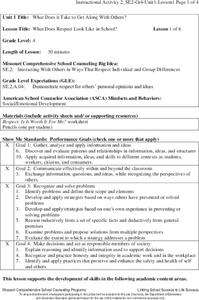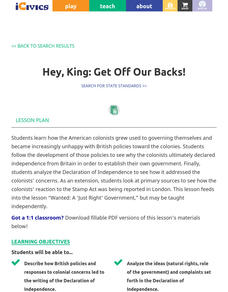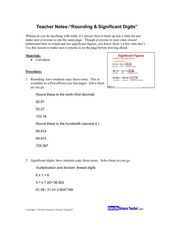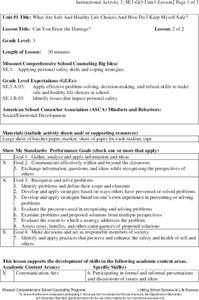Missouri Department of Elementary
Dealing with Peer Influence: What Are Bullying and Harassment?
Scholars examine examples of peer pressure and discuss how specific actions negatively affect one's well-being. Learners gather in small groups to write two scenarios in which peer pressure is used. They reference the STAR method in how...
Missouri Department of Elementary
The Hope to Cope: Coping Skills
Making decisions can be stressful, even for sixth graders. And even students this young have developed coping skills, some positive and some negative, to help them deal with stress. Class members are asked to identify several of their...
Curated OER
Acoustic Poems
Students explore acrostic poems. In this interactive poetry lesson, students visit the ReadWriteThink.org website to view characteristics and samples of acrostic poems. Students develop acrostic poems by using the interactive site.
Scholastic
Transitional Guided Reading
Use a fill-in-the-blank lesson plan template to enhance your guided reading lesson plans with details surrounding decoding strategies, fluency and phrasing, vocabulary strategies, comprehension, and more!
Macmillan Education
Changing Your Mindset
Why do some people achieve their goals and persevere despite the setbacks they face? This question is the focus of this life skills lesson, which includes worksheets, discussion, and collaborative activities on developing a growth mindset.
EngageNY
The Remainder Theorem
Time to put it all together! Building on the concepts learned in the previous lessons in this series, learners apply the Remainder Theorem to finding zeros of a polynomial function. They graph from a function and write a function from...
Missouri Department of Elementary
What Does Respect Look Like in School?
What does it mean to be respectful? Scholars complete a self-assessment worksheet to determine just how respectful they are. Next, they choose three items from the survey and write plans for how to improve in those areas.
National Endowment for the Humanities
Ratifying the Constitution
Ratifying the Constitution was no simple task. Using primary sources, such as classic writings from the Federalists and Anti-Federalists, young scholars examine the arguments for and against the Constitution. They then decide: Would they...
Museum of Disability
Buddy, The First Seeing Eye Dog
Learn about how the seeing eye dog program began with a reading lesson about Eva Moore's chapter book, Buddy, The First Seeing Eye Dog. With vocabulary words, discussion questions, and extension resources, the lesson is a...
EngageNY
Word Problems Leading to Rational Equations
Show learners how to apply rational equations to the real world. Learners solve problems such as those involving averages and dilution. They write equations to model the situation and then solve them to answer the question —...
EngageNY
Comparing Irrational Numbers
Build on your classes' understanding of irrational numbers by comparing their values. The 13th lesson in the 25-part module has individuals estimate values of both perfect and non-perfect roots. They finish by graphing these numbers on a...
Missouri Department of Elementary
What Color is Your Apple?
Build your classroom community with an activity that uses apples to examine oneself and their classmates. Participants draw four large apples on blank paper then exchange them within a small group. Group members write a character trait...
Missouri Department of Elementary
Same and Different
A take on "If You're Happy and You Know It" opens a lesson about similarities and differences. Scholars speak in-depth on the unique characteristics that make up their classroom. The teacher or counselor records responses. Class members...
Missouri Department of Elementary
My Feelings
Encourage self-awareness with a lesson that challenges scholars to identify feelings—happy, sad, mad, and scared. Using a feelings thermometer, similar to that of a bar graph, pupils discuss how they would feel in specific scenarios then...
Missouri Department of Elementary
What are Comfortable (Good) and Uncomfortable (Bad) Feelings?
Two puppets open a discussion about comfrotable and uncomfortable touches. Scholars add to the discussion information they remember from a previous lesson, then delve deep into three problem-solving safety rules, and explore...
iCivics
Hey, King: Get Off Our Backs!
Young historians explore the reason American colonists were unhappy under British rule. Class members complete hands-on activities and participate in a group discussions to understand why colonists drafted the Declaration of Independence.
The New York Times
Investigating the Heroin and Prescription Opioid Epidemic
How bad is the opioid crisis in America? Has it gotten worse in the last few decades? Why? High schoolers delve into these questions with a thorough and thoughtful lesson from The New York Times on heroin prescription opioids....
Curated OER
Rounding and Significant Digits
Practice rounding numbers to a certain decimal by solving in-class problems. Learners will solve several multiplication, division, addition, and subtraction problems while rounding to a specific decimal. They will also check their work...
Macmillan Education
Communicate/Cooperate
Prepare pupils to communicate effectively throughout their lives with this set of worksheets and activities, which are part of a 23-lesson series on valuable life skills. Class members will define communication and cooperation, discuss...
Missouri Department of Elementary
How Does a Friend Act?
Two puppets showcase social skills while scholars decide whether their actions are positive or negative. Learners take turns with the puppets, acting out scenarios with a peer while the rest of the class decide if they're being a good...
Missouri Department of Elementary
Can You Erase the Damage?
A pencil and an eraser bring forth the message that negative comments never truly disappear. On a large piece of paper, scholars list negative comments then attempt to replace them with kind ones. Pupils discuss the impact of negative...
Missouri Department of Elementary
Opportunity Knocks, But It Costs, Too!
Sixth graders practice six steps to effective problem solving. Working with the school counselor, class members are presented with a scenario that requires them to make a decision. Individuals then write a reflection in which they...
National Endowment for the Humanities
George Washington: The Precedent President
Everyone knows that George Washington was the first president, but do your scholars know why that was so important? The lesson plan, the third in a sequence of three, allows learners to understand how George Washington set a precedent...
Practical Money Skills
Using Banking Services
Using a bank is a privilege and a responsibility for young consumers. Teach them the important terms and details about creating accounts, using an ATM, and maintaining a credit card.























